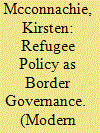|
|
|
Sort Order |
|
|
|
Items / Page
|
|
|
|
|
|
|
| Srl | Item |
| 1 |
ID:
183817


|
|
|
|
|
| Summary/Abstract |
Borderlands and bordering processes are central to politics and the governance of people, goods, and territories, not only as markers of territorial-administrative control but also as practices that shape the dynamics of inclusion and exclusion, mobility/immobility, and relations of power and authority. This special issue focuses on Myanmar, where political governance is deeply entangled with ethnicity, territory, borders, and bordering processes. We attempt to untangle these relationships by adopting an approach that combines consideration of how borderlands are governed with recognition of the ways in which borders, borderlands, and border populations shape governance and administration. We define this approach as ‘border governance’, by which we mean governance in, of, and through borderlands. In this introduction, we explore the meaning and significance of border governance as it relates to Myanmar, its ethnic border states, and their relations to other nations bordering the country. In doing so, we engage with and develop scholarly debates in three primary areas: (i) Borders, territoriality, and bordering processes; (ii) Plural governance and everyday bordering; (iii) Peacebuilding and the borders of transition. The articles in this special issue were written prior to the military coup of February 2021. Nevertheless, the central arguments presented here remain relevant, as does our conclusion: to achieve lasting peace in Myanmar, the borderlands must be at the centre.
|
|
|
|
|
|
|
|
|
|
|
|
|
|
|
|
| 2 |
ID:
188527


|
|
|
|
|
| Summary/Abstract |
This article unpacks how state-led borderwork from above is dynamically and creatively negotiated and navigated from below by migrants and smugglers. It identifies certain everyday borderwork assemblages and describes the struggles that produce social and material infrastructure and geographical reconfigurations of mobility. The empirical material presented in this study is drawn from legal and policy reviews, life-story interviews with return migrants and key informant interviews with refugees, smugglers and migration-governing actors. In the Horn of Africa in recent years, Ethiopia has become a major sending and transit country of migrants and asylum-seekers. This development has generated both internal political challenges, as well as ΕU pressure on the Ethiopian government to introduce legislative and organisational structures to control clandestine migratory exits from and refugee transitions through Ethiopia. In exchange, the EU extends various promises to provide, for example, development aid and economic cooperation. However, the external pressure calling for stricter border controls and Ethiopia’s tighter migration laws have not stopped clandestine migration and refugee transits, nor have they facilitated safe and orderly migration, as promised. The article argues that migrants, their families and brokers continuously struggle and develop new strategies to redirect and spatially reconfigure migratory departures, despite the new restrictions. These are manifested in Ethiopia by the emergence of dynamic forms of clandestine migration pathways and complex smuggling arrangements facilitating migration to the Middle East and southern Africa.
|
|
|
|
|
|
|
|
|
|
|
|
|
|
|
|
| 3 |
ID:
183823


|
|
|
|
|
| Summary/Abstract |
Refugees have been largely overlooked in analyses of Myanmar's transition, apparently considered peripheral to more prominent topics such as negotiation with armed groups, economic reform, and political elections. By analysing approaches to return and repatriation in three distinct contexts—refugees in camps in Thailand, Rohingya refugees in Bangladesh, and Chin refugees in Malaysia and India—this article shows that proposals for the return and repatriation of refugees are a form of ‘border governance' (that is, governance in, of, and through borders). This operates at three scales: (1) global border control by keeping refugees in their region of origin or returning them to their country of origin, (2) national border control by reinforcing boundaries between Myanmar and its surrounding states, and (3) the governance of political transition by reinforcing the Myanmar government’s narrative of peacebuilding by recasting continuing conflict as conditions suitable for refugee return. Premature promotion of repatriation has a number of harmful outcomes for refugee communities: encouraging the withdrawal of international aid, escalating fear and uncertainty, and political bolstering of a Bamar-dominated government and military vis-a-vis ethnic minority groups. This analysis supports a broader understanding of repatriation and its consequences, recognising that the promotion of refugee return can have significant political implications that are apparent even before mass returns have been carried out and which may reverberate far into the future.
|
|
|
|
|
|
|
|
|
|
|
|
|
|
|
|
|
|
|
|
|